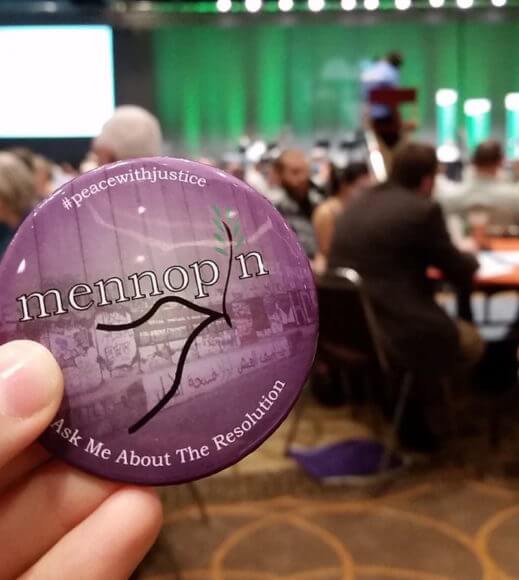This is part of Marc H. Ellis’s “Exile and the Prophetic” feature for Mondoweiss. To read the entire series visit the archive page.
On Thursday, the Mennonites passed a historic BDS resolution (PDF) regarding the Israeli-Palestinian conflict. Another Christian denomination has done its due diligence regarding a Jewish state gone wrong and Palestinians suffering under Israeli occupation. Has it?
The details of the Mennonite resolution are of interest as their own publication refers to the thrust of the resolution as adopting a “third way.” In the case of Israel-Palestine, “third way” refers to a dual solidarity with Palestinians and Jews. The reasons for this dual solidarity are discussed by the Mennonites as, on the one hand, Palestinians suffer today under Israeli occupation and, on the other hand, Israel exists and must be supported because of historic Christian persecution of Jews. In their discussion and documents, the Mennonites are careful to keep these two realities before them, as well good relations with Jews as their neighbors. The Mennonites think they can side with both, indeed they must; it is part of their Christian witness of confession, solidarity and reconciliation.
Though the resolution passed by the Mennonites is, in the main, weaker than other Christian denominational statements/resolutions, other denominations follow this dual solidarity strategy. Though in our present oppositional climate, these BDS resolutions seem courageous, and in some ways they are, at another level they come up short. Instead of bold and efficacious strikes against injustice, they have become the new normal in Christian discourse. That new normal? As Israeli power and control over Palestinians becomes permanent, the diminishing of Palestinian land and life becomes permanent as well.
In 1988, at the height of the first Palestinian Uprising, I wrote that the interfaith ecumenical dialogue between Jews and Christians in the West had become a deal: Jews would now define themselves as Christians repented of their anti-Semitism; Jews defined Christian support for the state of Israel as repentance for Christian anti-Semitism; Jews demanded Christian silence on Palestinian suffering; Any Christian dissent on Israeli policies toward Palestinians would be seen by Jews as a Christian return to anti-Semitism. In the last decades tremendous strides have been made by Christians in their desire and ability to speak out about Israel’s crimes against the Palestinian people. Many have thought, myself included, that the Christian denominational support for BDS is the great example of the willingness of Christians to finally break the interfaith ecumenical deal.
So it seemed. But, thinking of the last decades, culminating last week with the Mennonites “third way” resolution, further questions need to be asked. How have these BDS resolutions and implemented divestment and boycott policies effected Israel’s occupation of Palestinians? Has this movement brought Palestinians closer to their long sought freedom? Many analysts believe that the two-state solution is dead and that the Israeli occupation of Palestine is now permanent. Have the Mennonites and other Christian denominations come to grips with this fact?
Just the opposite, I reluctantly conclude. BDS within the Christian denominations seems more like an expansion – and extension – of the interfaith ecumenical deal. Sure the Jewish establishments in Israel and America have been unhappy with these church stands but since it seems that this is as far as the churches will go. Israel is still riding high. The damage to Israel is largely contained. So the question must be faced: Do these BDS resolutions, as important as they are symbolically, actually, because of their limitations, enable the further conquest of Palestine?
The interfaith ecumenical dialogue/deal has always been contextual. As times have changed the details of the dialogue/deal have changed as well. The dual solidarity with Jews and Palestinians seems to be the devil in the details. While moving forward, Christians want it both ways.
Christians want Palestinians and the world to know that Palestinians are not alone. Do they also want Jews and the world to know that their primary loyalty is with Jews?



What do Western Christian Establishment (not Hagee type Christians who seem to be motivated by personal salvation in heaven at the expense of everybody else, including the innocents on earth) leaders say, when one asks them if 2 wrongs make a right?
Why is it the Germans have to still material fund & diplomatically cover Jewish Israeli criminal conduct that transgresses the standards upheld ex post facto against fellow Germans at Nuremberg, and progressively, Geneva IV standards, but Jewish Israeli conduct remains immune from accountability, going back to the time of the Nuremberg Trials?